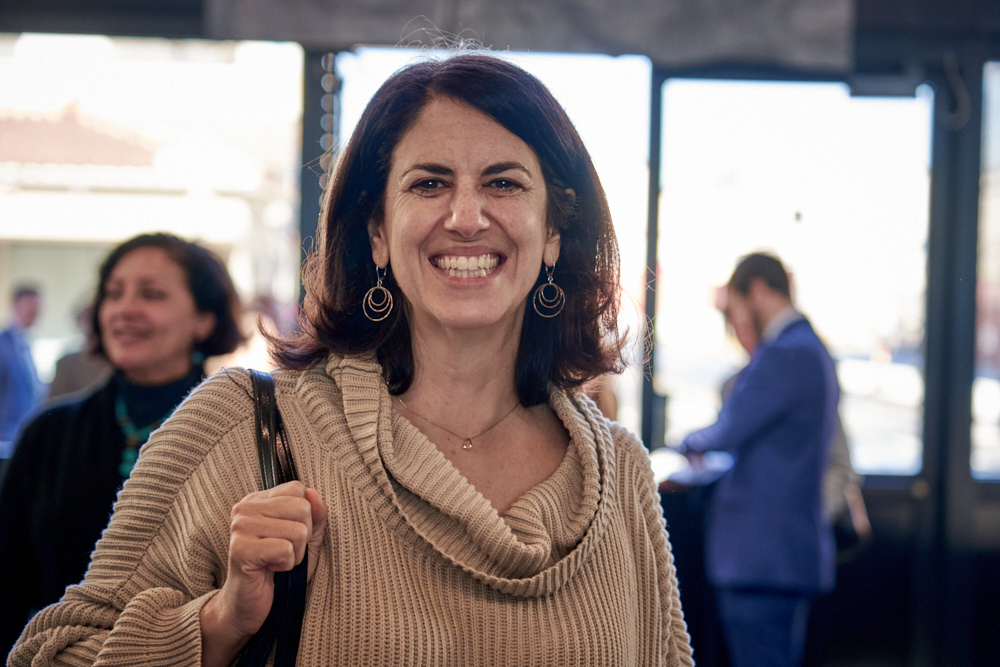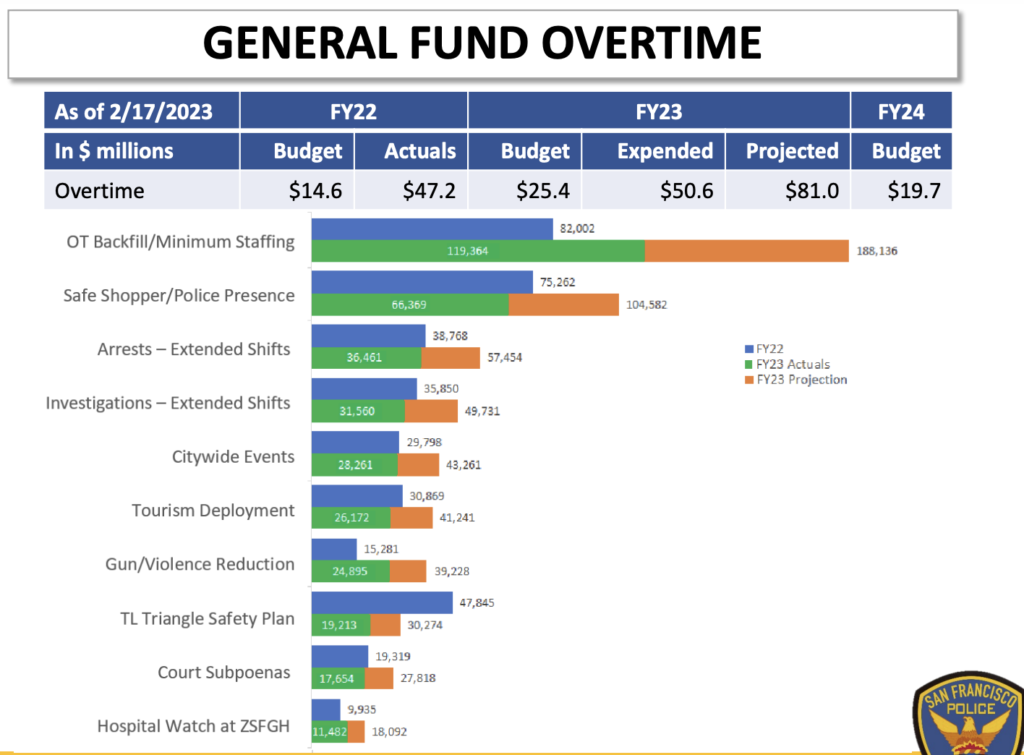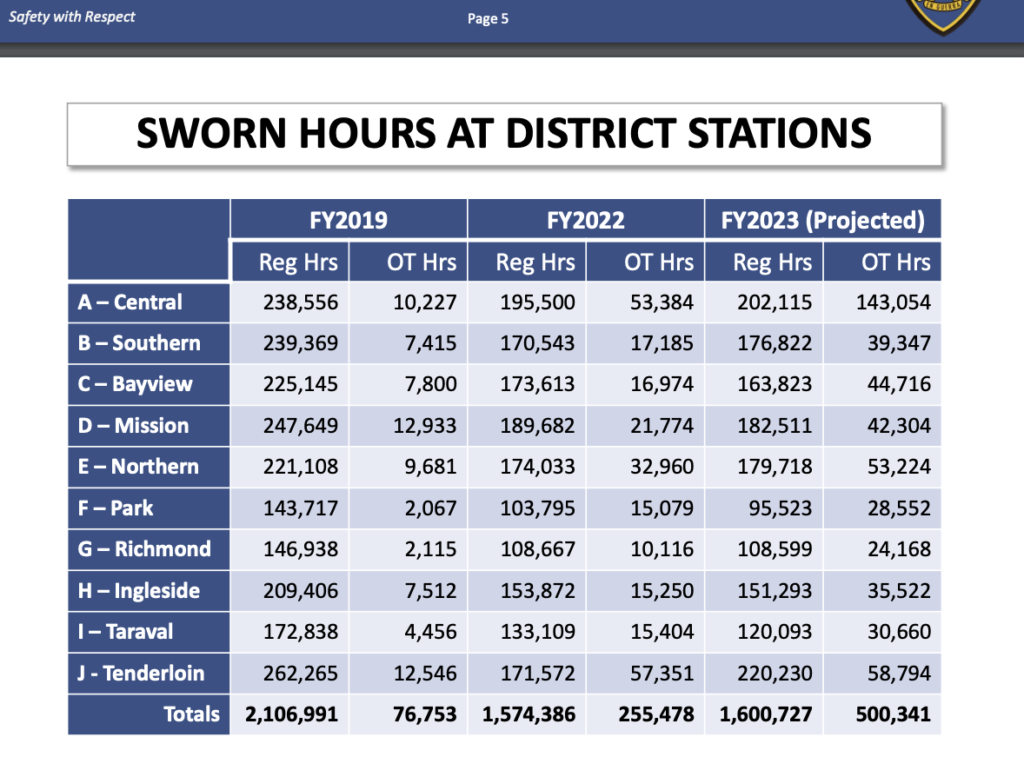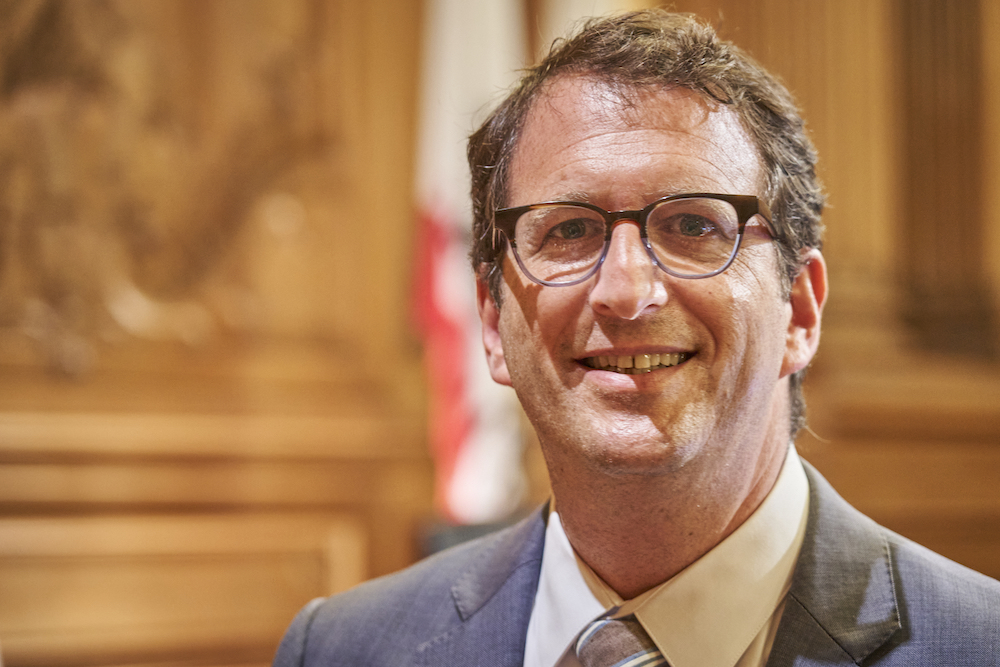Some of the supes at the Budget and Appropriations Committee were dubious about giving the cops more money, asking serious questions about the public-safety priorities of the city.
While that discussion in happening, Sup. Dean Preston is asking for money that would pay for non-police responses to public safety.

Chief Bill Scott presented the case for a supplemental police budget allocation of $27 million, and in the process, showed a slide demonstrating where overtime money has gone and will go:

Several supervisors noted that the highest area of spending, other than backfilling vacancies, is the Safe Shopper program, which is designed to protect tourists and high-end retail mostly at Union Square.
“We should be protecting the people of San Francisco, not Versace,” Sup. Hillary Ronen said.
Sup. Shamann Walton noted the numbers of homicides in the city last year (56), and the number of shootings (more than 200) and asked: “Is retail crime worth more than human life?”
He asked Scott how much a shirt costs at Louis Vuitton. The chief said he doesn’t shop there. “My staff found one for $10,800,” he said.
“We want to protect billion-dollar corporations that can protect themselves,” Walton said. “We should first protect human life.”
Walton said that, despite what the news media reports, violent crime is down in San Francisco, and property crime is declining. “There’s a lot of media sensationalism,” he said.
Indeed: The national and local news media love to talk about crime in San Francisco—although nobody seems to be putting any responsibility on the mayor and the district attorney. When Chesa Boudin was the DA, everything that happened in the city was his fault; Brooke Jenkins gets a total pass.
But let’s go back to the deployment question. The plan that the chief presented would, among other things, divert officers who currently patrol public housing to other duties. Walton challenged the chief on that: “You can look me in the eye and say you love the southeast part of the city, but the data does not show that,” he said.
Here’s some of the data, which Sup. Aaron Peskin analyzed:

If you start with the 2019 hours at each district station, and you add up the regular time and overtime hours (“hours are hours,” Peskin said, although overtime hours cost more) and compare with 2023, you can see that in most district stations, the numbers of cops in most neighborhoods have gone down. The Mission used to have the equivalent of 127 cops, and now has 117.
On the other hand, Central Station has gone up, from 119 full-time equivalent officers to 165.
“That’s your Union Square hours,” Peskin said. “This is a resource allocation issue, about allocating a lot of officers to a place were very few people live at a high price point. I haven’t seen any additional staffing in Chinatown.”
In fact, across the board, the committee members said that they wanted to see more foot patrols and presence in the neighborhoods, not just the tourist areas.
Ronen said she’s going to vote for the supplemental allocation, “despite the sick feeling that it gives me.” She said that cops deal with the symptoms of deep social problems, not the causes, “but right now the symptoms are so bad.” But said she wanted a report every two weeks on how that money was being deployed, by neighborhood.
So this thing is going to pass at the full board—but with the supes and the Breed Administration disagreeing about how it should be spent.
Preston is taking an alternative approach, which (despite again sensational news coverage) is not so much a “pushback against Mayor London Breed’s campaign for police overtime spending” as in investment in a different kind of public safety.

It’s entirely possible for supervisors to support Breed’s police spending but also to support Preston’s approach.
From his announcement:
The supplemental budget request would allocate $10 million for three emergency safety interventions: grants for small business safety improvements and security, expanded non-police ambassadors to Tenderloin and Lower Polk blocks that currently have no coverage, and a new street dealing intervention program.
Preston has been asking the Mayor’s Office to expand the ambassador program, but Breed has refused.
In fact, the administration has pushed all kinds of Tenderloin initiatives, including a renewal of the War on Drugs, but has offered no long-term strategies.
Preston:
I appreciate all the constituents whose input formed the basis of this, and I’m pleased that we’ve landed on an emergency package that brings folks together. These three approaches—ambassador coverage for uncovered parts of the Tenderloin, direct support for small businesses, and adding non-police street intervention in our approach to street drug dealing—will help address some urgent street conditions in a meaningful and positive way.
Meanwhile, as Walton noted, the mayor’s plan “will not put one more police officer on the streets.”





